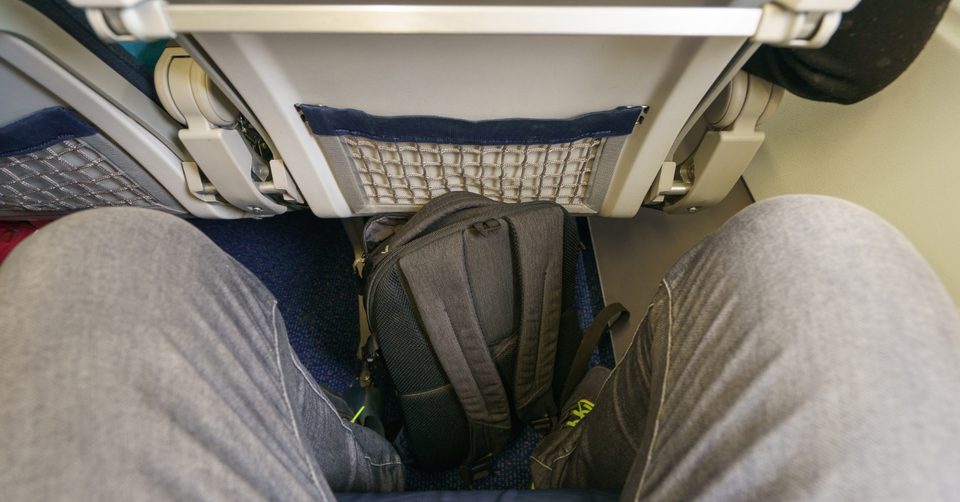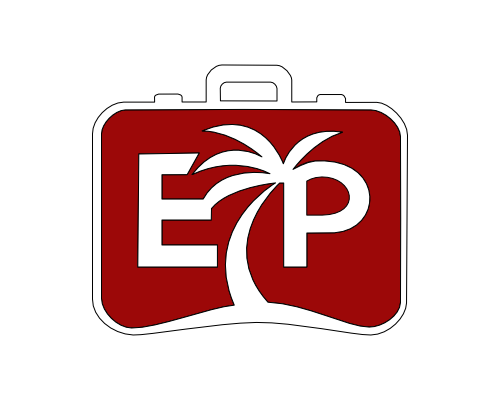How to Avoid Ultra-Low-Cost Carriers' Trickery and Other Dangers

Survive the ride, save your money, and protect your back.
I spent Christmas with friends, one of whom is a doctor. Over the 4th glass of wine, he casually mentioned the uptick in patients with back fractures due to the hard landings of a particular European Ultra-Low-Cost carrier (ULCC). I was shocked! It's popular among U.S. carriers, too. If you Google "airline with hard landings," you'll see memes, videos, and social media posts documenting this phenomenon. As I nursed a strained back (thankfully not airline-related), I felt relieved that I wouldn't be boarding any planes soon.
I've used these carriers many times, and while they've saved me a fortune, they've also taught me one thing: you have to stay sharp.
Those of you who live in the U.S. may know a store called Dollar General. One of my cousins like Five-Below. These stores sell the cheapest-made goods you need on a budget. Ultra-low-cost carriers (ULCCs) are like the dollar stores of the skies. The prices seem sweet if you catch them at the right time. For this reason, I love EasyJet. They don't pay me to endorse them, but I once took my family of five from Geneva to Nice for less than ~$100, including tax. I doubt I could do that now. I paid about ~$400 to London the other day for two from Lisbon, and 50% of that was tax and fees. These airlines hook you with nicely low prices, but every step of the booking process feels like a trick aimed at nickel and diming you on every screen of a ticket purchase. They are the masters of upselling.
I thought there might be many of you budget travelers who need a guide and get tricked into paying more. I sure did the other day, accidentally booking speedy boarding for one of my travel companions.
What's the Difference Between a ULCC and a legacy carrier?
Low-Cost Carriers (LLC) and Ultra-Low-Cost Carriers, also known as no-frills airlines (I will use the terms interchangeably), offer what you need without all the frills or fine dining, short lines, and pomp and ceremony. The quickest way I can explain this is flying on no-frills airlines, like staying at a budget hostel—you pay for an often uncomfortable bed in a room with others, but everything else (like towels and WiFi) is extra. They may have a vending machine to buy cheap processed food. A legacy carrier is like booking a boutique hotel ranging from 3 stars (many American carriers) to 5 stars (many Asian and Middle Eastern carriers)—your stay includes added comforts like meals, snacks, drinks, pillows, blankets, and more without constant upsells. Nowadays, I do notice many Western carriers, to cut costs and increase shareholder returns, are dumbing down their economy fares from 3-stars to one, like LLCs.
When Booking Online, Sidestep the Trickery
When you visit a ULCC's website, you're met with confusion. Relax and focus. Don't start this after spiritual drinks or while tired. You will need your wits about you. Sometimes, flashing advertisements encourage you to take advantage of deals like "Flights to New York for $50!" Those have buckets of restrictions. Don't fall for it. Before you click "Book," sending your credit card to oblivion, here are the pitfalls to watch out for:
- Basic Fare vs. Total Fare
- That $50 ticket? It only gets you on the flight. For the seat at booking, you must pay, sometimes more than your fare. Want to bring check-in luggage or a carry-on bag, choose your seat, or even have priority boarding? Expect the total price to balloon.
- Travel Tip: Stick with the base fare, but pack light and be prepared to sit wherever they assign you, even if you are traveling with a companion. RyanAir always separates me from my travel companion. I don't care!
- Hidden Fees To the Moon
- ULCCs will charge for nearly everything: printing your boarding pass at the airport, failing to check in online, travel insurance, paying upfront for WiFi (it often does not work) or renting a car, using your credit card (well, to fair, the credit card changes them).
- Travel Tip: Always read the fine print during checkout and ensure you complete every necessary step before arriving at the airport. The airline's app allows you to check in for free 24 hours before a flight. Put a reminder in your calendar.
- Baggage Size and Weight Trickery
- ULCCs are notorious for their stringent baggage policies. If your carry-on exceeds their dimensions—even by an inch/centimeter—you'll pay dearly. I saw this hilarious case of a personal backpack too big for free travel and wrote about it. Read to the end for the link.
- Travel Tip: This may seem too perfunctory, but use a tape measure to check your bag dimensions and buy a portable luggage scale, those with the little hook, to weigh everything to avoid surprises at the gate.
- Upsell Madness
- You'll be prompted to add "extras" like travel insurance, car rentals, seat plans, and meal plans during booking. It's easy to accidentally click "yes" on an upsell, especially when the link to the upsell is boldly displayed and the 'continue-without-the-upsell' link seems almost hidden.
- Travel Tip: Ditch the smartphone and book on a computer so you can see everything clearly. Decline all extras unless they're absolutely essential, like if you have a medical issue that requires more legroom.
- Dynamic Pricing
- Prices can jump up, never down, mid-booking if you take too long. Decide quickly and have some idea of what you are willing to pay before you start so you know whether you are getting a deal. Like everyone else, ULCCs use cookies to track your activity, increasing prices based on perceived demand.
- Travel Tip: Use incognito mode or a different device, and clear your browser cookies before searching for flights. Better yet, use a VPN, but keep in mind that airfares also vary according to where you are buying it from.
You make it to the Flight: Here are some Do's and Don'ts
Once you've successfully navigated the booking process, the flight itself will present its own set of challenges.
- Uncomfortable Seats
- The seats are notoriously cramped with minimal padding. This is getting to be true of most Western carriers.
- Travel Tip: Bring a small travel pillow or lumbar support to protect your back, and if you paid for a seat, choose an aisle seat for easier movement.
- Pack Snacks and Water
- Don't expect free peanuts or water. Everything is for sale—and overpriced and underquality (hmm, is there such a word?).
- Travel Tip: Bring your own snacks and buy water after passing through security. Better yet, bring your reusable water bottle from home and fill it in a fountain after security.
- Entertainment
- Forget in-flight movies or complimentary magazines. These airlines expect you to entertain yourself.
- Travel Tip: Download movies, shows, or books before your flight, and bring noise-canceling headphones. Or travel with a nice companion who knows when to talk and when to rest.
- Mind Your Posture
- Long flights can take a toll on your body, especially with hard landings.
- Travel Tip: Do micro-exercises in your seat, like ankle rolls and shoulder stretches, to improve circulation and reduce stiffness. Below is a link to my how-to post.
Things Sometimes Go Wrong
As you can imagine, they are not inexpensive by accident. They cut costs with cancellations when required, have minimal customer service, and aircraft park away from the terminal to accommodate hard-stand parking, which tends to be cheaper at most airports (think of a car's parking lot). Here's how to handle it:
- Know Your Rights
- In the EU, Regulation 261/2004—worth reading if you travel a lot in the EU—entitles passengers to compensation for significant delays or cancellations, provided certain conditions are met. See the end of this post for a bonus on the U.S. rules.
- Travel Tip: Keep all documentation (boarding passes, receipts) and submit a claim immediately if you qualify for compensation. If you only have electronic boarding passes, screenprint them from your smartphone and save them electronically for later.
- Stay Calm and Advocate for Yourself
- Airline staff are often overworked and undertrained. I know this since I was one of them. Don't be an asshole! Yelling won't solve the problem. I suggest reading my article on the topic, ICYMI.
- Travel Tip: Be polite, compassionate, and assertive based on being informed. If needed, escalate issues through official customer service channels. Again, be smooth about it!
Why Fly ULCCs, Anyway?
Despite the pitfalls, ULCCs can be a blessing for your pocket, provided you are not one that attaches too much significance to flying in luxury. I used to look for low fares in cities I wanted to visit, and once I found an unbelievably low fare, I booked it months in advance and set it in my calendar. Then, I get a reminder closer to the time and book accommodations for a quick, inexpensive break in a new city. Plan and stay alert so you can enjoy their low fares without falling into their traps.
Ultimately, it's about trade-offs. You're sacrificing luxury for savings. But when you're prepared, the journey can still be smooth—back intact and your bank account not in shock!
BONUS: U.S. Department of Transport Rules (DOT)
The DOT rules are not as robust as the EU, and there are no surprises there. However, they do have some rules worth keeping in mind since airline staff either don't know these rules or their company has a soft policy of not informing U.S. travelers about them. In general, they have rules about treatment during delays or cancellations and specific rules that airlines must follow, but these focus more on consumer rights and less on compensation.
- Tarmac Delay Rule (14 CFR 259.4):
- For domestic flights, airlines must allow passengers to deplane after 3 hours of waiting on the tarmac unless there are safety, security, or air traffic control reasons for the delay.
- For international flights, the limit is 4 hours.
- Airlines must provide food, water, operational lavatories, and medical attention if needed after a two-hour tarmac delay.
- Refund Policy for Cancellations and Delays:
- If your flight is canceled, significantly delayed, with you sitting on the plane (more than 3 hours for domestic, 4 for international), or rescheduled, and you choose not to travel on their suggested alternative, airlines are required to provide a full refund, even for non-refundable tickets. Who knew this?
- Airline Customer Service Plans:
- Do you know when you have a problem, airlines seem not to have a telephone number with a human at the other end? Airlines operating in the U.S. must publish customer service plans that outline their compensation and service policies for delays, cancellations, or mishandled baggage. Yes, I said plans.
Much of these customer-oriented rules may change in a Republican administration, so be prepared for flying to be a bit bumpier as we move to a more buyer-beware paradigm in the travel world. I will keep you informed as I see changes.
Articles mentioned during this post, in case you missed them (ICYMI)
- Stay Calm When You Travel. ICYMI, here is my article on the benefits of doing this.
- Here is how and why you should pack light to save costs and be freer when you travel.
- A carry-on bag can cost more than your airfare. The traveler in this story was having none of it and went nuts. Read here to catch this story.
- In-flight micro-exercise keeps the blood flowing. See how to post here.






Member discussion